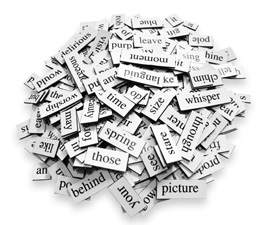Descriptors you can't live without
When it comes to constructing a sentence, the verb is widely considered to be one of the most integral elements. In the simplest of definitions, a verb is an action. Run, drink, talk, drive, and dive are all verbs.
But as with everything English, it can't possibly be that easy, can it? Of course not! Verbs can be transitive or intransitive, can change based on tense, or can just be plain irregular. Never fear, Scribendi's English proofreaders are here to explain the ins and outs of verb usage.
Verbs are a way of life
A verb, in the English language, is used to describe an action (talk), an event (crumble), or a state (rest).
Here is an example of verbs at work:
The dog will run to his owner and play in the park.
Both "run" and "play" are verbs, as they are things that the dog is doing.
Transitive and intransitive verbs
A transitive verb is used when someone does something to an object. This means that the sentence must have an object. For example, "Bobby finished his homework." In this sentence, Bobby, the subject, did something to his homework—he finished it. "Homework" is thus the direct object in the sentence. On the other hand, intransitive verbs don't require direct objects. For example, "Sandra will sleep until noon." The verb "sleep" has no object. Verbs of motion are further examples of intransitive verbs, e.g., "She ran" or "We drove."
There's no need to be tense about verbs

The proofreaders at Scribendi recognize 18 possible verb tenses. This may sound intimidating, but unless you're a linguist, you'll probably never even notice you're using them! The three tenses that are most commonly referred to are present, past, and future:
Present: I drink.
Past: I drank.
Future: I will drink.
A present tense verb is used to describe something you are currently doing. The past tense is used to describe something you have done, and the future tense denotes your intention to do something later.
It is important to use the correct tense when you are writing. If you are writing in the present tense, your verbs must reflect this.
If your narrative takes place in the past, you must use the past tense. Remember, when writing in the past tense, you must conjugate (modify) your verbs from present to past. This is seen in the example above. In the present tense, you drink, but in the past tense, you drank (drink has been conjugated, or modified, to reflect the past tense).
Irregular verbs
You may be wondering why, when drink moved from present to past tense, its spelling changed. This is due to one of the trickiest things in the English language: the irregular verb. There are more than 370 irregular verbs in modern English, most of which occur when a verb is conjugated into the past tense. An irregular verb is one that cannot be conjugated by adding –es, –ed, or –ing to it.
Here is an example of a regular verb compared with an irregular verb:
|
Regular Verb: "Laugh" |
Irregular Verb: "Dig" |
||
|
Present: |
I laugh |
Present: |
I dig |
|
Past: |
I laughed |
Past: |
I dug |
|
Future: |
I will laugh |
Future: |
I will dig |
As you can see, to conjugate the regular verb, our English proofreaders need only place an –ed at the end, leaving the word otherwise unchanged. To conjugate the irregular verb, however, we added nothing to the end, but rather changed the spelling of the original word.
This concept is often difficult for native English speakers to comprehend, so one can only imagine the difficulties that English as a second language students must encounter! Common errors occur when students fail to recognize these special rules, resulting in incorrect verb usage, such as "I digged a hole!" or "I drinked all of my milk!"
Remember the basics
Although verbs are often a source of confusion for new writers, these action words are nothing to be worried about. Simply remember that if you are describing an action, you need a verb to do it.
If you are learning English and are worried about your use of proper verb tense or conjugation, please don't hesitate to submit your document to the professional editors and proofreaders at Scribendi. Our experts are always available to help improve your English writing.
Image source: LaBruixa/Pixabay.com









